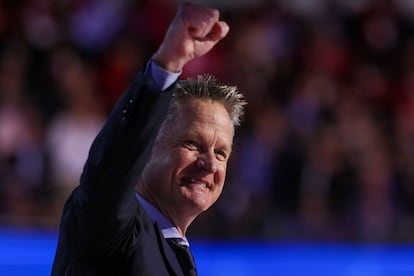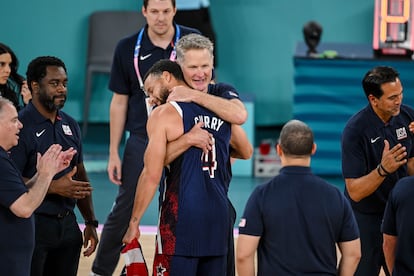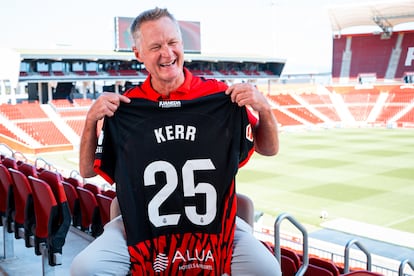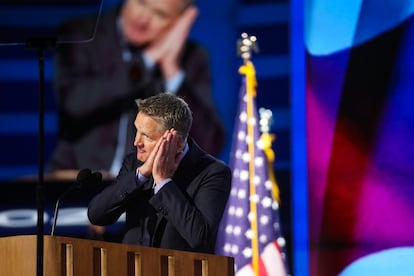Steve Kerr: ‘No company in the world would hire someone with Trump’s resume’
The Golden State Warriors and Team USA coach talks politics, leadership and the synergies between soccer and basketball during a visit to Mallorca

Steve Kerr’s love affair with soccer coincided with the start of his stint as a basketball coach. During the 2014 World Cup, shortly after being named coach of the Golden State Warriors, the most successful and influential dynasty of the last decade in the NBA, he fell in love with the game and quickly understood that both sports shared dynamics, teaching, and impact. Four rings and a basketball revolution in this span of time attest to the mark he and his team have left on the discipline, and beyond it as well. The renowned coach, a former player on Michael Jordan’s famous Chicago Bulls of the 1990s, as well as a member of the RCD Mallorca ownership group since 2023, talks to EL PAÍS about his commitment to the club and many other current sports and political issues after visiting the Spanish top-flight team’s facilities and giving a motivational talk to the players.
Question: Why did you decide to get into soccer?
Answer. There are a couple of reasons. The first is that I love watching soccer, it’s a fantastic sport that I got into about 10 years ago. I learn a lot from watching soccer, and I think it helps me with basketball. They’re very similar sports in many ways. Another reason is that I’ve known Andy [Kohlberg, a former tennis player and co-owner of the club since 2016] since my playing days in Phoenix, so he knew about this project and when the opportunity came, he called me and asked if I was interested in getting more involved. It’s exciting for me to cheer on the team, every weekend I watch the game and try to follow news of the club. Being emotionally involved in something like that is fun, and even though I don’t own a large part of the team, I feel very connected and it’s something I love.
Q. And why in Mallorca?
A. It’s a beautiful island. When my wife and I talked about taking this step, we also saw it as the perfect excuse to spend a few days in Mallorca every summer [laughs]. It’s a very beautiful place, and Palma is lovely. This is only our second visit, and we’re here for a wedding. We’ve had dinner at a couple of restaurants with Andy and seen more places on the island. I love being able to swim in the Mediterranean Sea, being in the water relaxes me deeply.
Q. You say you get ideas from soccer…
A. In the U.S., I often watch Premier League and La Liga games on the weekend. A few years ago, I showed the team a video about tiki-taka, the FC Barcelona-based passing style. Our Warriors’ identity is also based on passing, and I really believe in the power of passing. If you can connect the game and the players, you can connect people emotionally. That’s why I taught tiki-taka to my guys. They really liked it, and years later, when I had forgotten all about it, we made a great play with a lot of passes to get a layup and Klay Thompson, from the other side of the court, looked at me and yelled, ‘tiki-taka!’ The concept stuck with them. In general, soccer and basketball share a lot of triangles, three-man actions. If you notice, basketball players who grew up playing soccer have a better vision of the court and greater clarity in decision-making.

Q. This year, there was a lot of talk about Pep Guardiola’s influence on Joe Mazzulla’s NBA champion Celtics.
A. Exactly, Pep is a good example. I was particularly inspired by Jürgen Klopp. I started following Liverpool because of Mo Salah, as I lived in Egypt for three years as a child [Kerr was born in Lebanon] and since then I have been in love with the people and the country. When I saw him at the World Cup, I decided to follow his team, and watching Liverpool I was inspired by the energy that Klopp transmitted. His connection with the city was special. I decided to travel to visit him, see how he trained and meet him, and lo and behold, he now lives here in Mallorca.
Q. Before the Olympics you had already said that you would not continue as coach of Team USA. Did that add extra pressure to what you were already under?
A. That’s true, but there’s always a lot of pressure being the U.S. coach. It doesn’t matter who or when. I’ve always believed that it’s a unique experience. You coach at one Games and you pass the baton to the next. That’s always been the case, with the exception of Coach K [Mike Krzyzewski, who coached three Olympic cycles after the debacle in Athens in 2004]. USA Basketball is in very good hands, and it’s time for another coach to take over.
Q. How did it feel to win that gold medal?
A. There's definitely some relief, because that's what everyone looks forward to. The joy of being able to compete in a high-pressure environment, whether it's an NBA Finals or an Olympics, is the most fun part of our profession. If you're lucky enough to get to that level, of course. I love those moments, even when you lose. That's sports, that's what competition is all about. The last time we won with Golden State was in 2022, and these last two years we hadn't felt that thrill that the big stage gives. Being able to feel that again has been great, it's something I love.
Q. It wasn’t an easy road, though. Serbia made things very difficult, and France were in it until Steph Curry made those four triples that went around the world…
A. That’s true. The globalization of basketball has been wonderful for the sport and for all of us involved, from the NBA to the fans. The league is full of international players, and several of the best players in the NBA are foreigners. Luka Doncic, Nikola Jokic, Giannis Antetokounmpo are among the best in the world, and the next one is Victor Wembanyama. I think that, in general, in the United States we have more great players than anyone else, and that is our main advantage on the court. There are a lot of difficulties though. It’s not only the strong players and teams out there. The format is also difficult. The 40-minute games, the FIBA regulations and the fact that it is a life-or-death game. If it were a series of several games, like in the NBA playoffs, I don’t think we would have any problems. The opposition teams give their best against us, and even more so when they know that in one game they can beat us.

Q. You’ve seen Curry a lot of times, but that run in the Olympic final made the difference.
A. He was incredible, and I’ve seen him do it countless times. This time was different, unique. This was the Olympic Games, a unique stage, and those four three-pointers in the last two minutes showed the world who he is and why it’s wonderful to watch him play basketball.
Q. What was it like coaching LeBron James?
A. It was a great honor, and he exceeded all my expectations. He was the most professional, best-prepared and connected player I have ever had under these circumstances. In every training session he was acting as a leader, giving recommendations and accepting our advice. It was wonderful to be able to see him up close and understand why he is one of the greatest.
Q. You have always been surrounded by great players, what makes them so special?
A. They all combine talent, intelligence and work ethic. Their passion for the game usually leads them to that work ethic, and they have to be competitive. The best players are all very smart. Not only does it allow them to win games, but they also understand perfectly how to take care of their bodies, train, and detect their areas of improvement. Guys like LeBron, Steph, Tim Duncan or Michael Jordan are very different, but they all share intelligence as their main trait.
Q. In that sense, what was it like sharing a locker room with Michael Jordan?
A. A unique experience, and at the same time a very difficult one. He was very hard on us, but he raised the standard of play and pushed the rest of us. He demanded the maximum from everyone on a daily basis, and he was very successful with his leadership style, although I can’t say if anyone could emulate him in that sense.
Q. Other leaders were not so tough?
A. Exactly. With Steph it’s completely different. He’s much calmer, and his demands come from leading by example. He stays longer than necessary to work on his shooting or go to the gym. He doesn’t usually yell at the guys, but he teaches them what it means to be a professional. He’s a fun, cheerful guy, and it’s a totally opposite mentality.
Q. How can a coach be successful among so many stars?
A. I was fortunate to play for some of the best coaches in history: Phil Jackson, Gregg Popovich, Lenny Wilkens and Lute Olson, my college coach. I learned a lot about the game from them, but the main lesson was understanding the importance of each player and the importance of getting to know them on a personal and mental level. What's their story? What motivates them? What bothers them? That kind of thing. In basketball you have 15 players and you can make deep connections, honestly care about them. Obviously, you have to find the balance and sometimes you have to be tough on them.

Q. Being a coach also means being exposed to a lot of criticism, and you still get criticized for not taking Jaylen Brown to the Olympics and leaving Jayson Tatum on the bench. How do you deal with that?
A. I think even Draymond Green has criticized me for it. It's okay, you have to embrace this part of the job. In the NBA and at the elite level, there is a very high level of passion and interest. I always tell the players and the coaching staff the same thing: if they pay us so much money it's because people are interested. If you want to play or train without being criticized, you better go to the local court. That's how this business works, and with social media, it's even more common these days. As a coach, the important thing is not to worry about what people say, but always do what your heart and head dictate. If you do that, you can live peacefully with yourself.
Q. You have never shied away from talking about politics and thorny issues. Why do you get involved in those matters?
A. We live in a democracy, and this system is made by and for the people. That’s the reality. Citizens can help determine what happens in the country, what laws exist, and who leads a project. I realized that with this platform, especially since I started coaching the Warriors, people would listen to me. I often speak out on issues that matter to me, such as gun control. I got involved in these issues and I don’t regret it at all.
Q. Here in Spain, it is not at all common for sports figures to talk about these issues.
A. When I was playing, it wasn't common in the United States either. We're seeing a change, and the state of politics in my country has made a lot more people feel challenged to speak out loud and clear. When I was a player, almost no one dared. In the end, it depends on each person, and you have to feel comfortable. Let everyone decide.
Q. You were at the Democratic convention in Chicago. How worried are you about Donald Trump?
A. I’m very concerned about him becoming president again for several reasons. The first is his lack of character. No company in the world would hire someone with Trump’s resume. Convicted of fraud, sexual assault... in fact, at the Warriors, where I work, I wouldn’t even be allowed to hire him. And despite all this, we’re going to make him president of our country? I think character is extremely important in leadership positions, and his morals are conspicuous by their absence.
Q. Your father was shot dead when you were 18, how did that affect you?
A. It left a mark on me and taught me a lot about perspective. As a player and coach, the games are important, but there are things beyond that that are far more relevant. It gave me the insight to speak out in public and focus on issues like gun violence and its prevention. I know what it feels like to lose a family member because of this. It’s a very unique problem in the United States and in most countries, if not any other country, people don’t go into schools and colleges with guns to kill children. That doesn’t happen anywhere else. We know there are solutions and that’s why it’s important to speak up and talk about it.
Sign up for our weekly newsletter to get more English-language news coverage from EL PAÍS USA Edition
Tu suscripción se está usando en otro dispositivo
¿Quieres añadir otro usuario a tu suscripción?
Si continúas leyendo en este dispositivo, no se podrá leer en el otro.
FlechaTu suscripción se está usando en otro dispositivo y solo puedes acceder a EL PAÍS desde un dispositivo a la vez.
Si quieres compartir tu cuenta, cambia tu suscripción a la modalidad Premium, así podrás añadir otro usuario. Cada uno accederá con su propia cuenta de email, lo que os permitirá personalizar vuestra experiencia en EL PAÍS.
¿Tienes una suscripción de empresa? Accede aquí para contratar más cuentas.
En el caso de no saber quién está usando tu cuenta, te recomendamos cambiar tu contraseña aquí.
Si decides continuar compartiendo tu cuenta, este mensaje se mostrará en tu dispositivo y en el de la otra persona que está usando tu cuenta de forma indefinida, afectando a tu experiencia de lectura. Puedes consultar aquí los términos y condiciones de la suscripción digital.









































